How Cobra Beer regained its sparkle
- Published
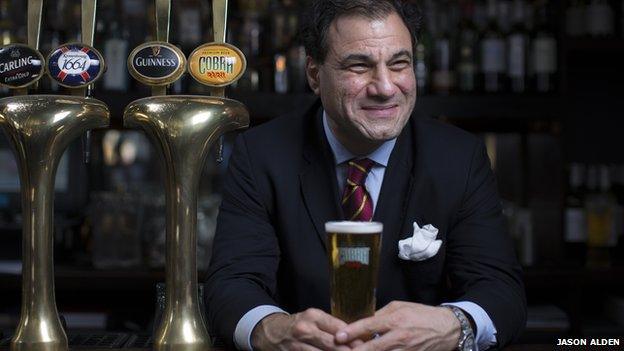
Lord Bilimoria speaks openly and honestly about the difficulties his company Cobra Beer faced back in 2008.
The producer of one of the UK's most popular lagers, his business had grown too fast and over-extended itself. It was making a loss, and had built up substantial debts which it was struggling to service.
While this situation may have been rectifiable in benign economic conditions, the global financial crisis that exploded in 2008 meant that Cobra had to put itself up for sale in November of that year.
"We had lots of debt and we didn't see the crisis coming," says Lord Bilimoria, speaking at Cobra's headquarters in London.
At the time the company had been growing by an average 40% every year since it was set up in 1989.
All potential profits had been invested back into continuing to grow the company, so its cash reserves were running very low at a time when Lord Bilimoria says "cash didn't just become king - it became emperor".
He adds: "What I could have done - should have done, with hindsight - is proven the profitability [of the business] for two or three years, and slowed down the growth. But at that stage... the mindset when you are growing at 40% is that you are on a roll."
Cobra was saved in May 2009 when, under a so-called "pre-pack administration" deal - a pre-arranged agreement that saw the firm go quickly in and out of administration - Lord Bilimoria bought the business back in a joint venture, external with North American brewing giant Molson Coors.

What is a pre-pack administration?
A pre-pack administration is one in which the insolvent company has already lined up a buyer for its profitable assets before it enters administration, allowing a sale within days
It allows a firm to write off its debts and helps it close down loss-making parts of the business
Critics say pre-packs "stitch up" unsecured creditors and can allow directors to shed liabilities and buy back the business (under a new company)
Others say that if a firm is by definition insolvent, unsecured creditors are unlikely to get their money back anyway, and that pre-packs allow for a quick rescue of the business and help secure jobs
In recent years, big names including Blacks Leisure, bed retailer Dreams and JJB Sports were all sold under pre-pack deals

The deal wiped out Cobra's debts, leaving creditors £71m out of pocket.
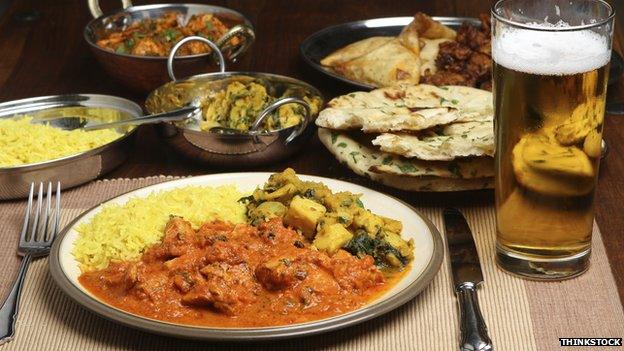
Cobra Beer was initially targeted at the UK's curry restaurants
However, Lord Bilimoria, who is Cobra's chairman, says he is paying back every single person, despite having no legal requirement to do so.
"It is my belief that if you go through a tough time it is not just what you do, but how you do it," he says.
Illustrious father
Born in India in 1961, Karan Bilimoria is the son of a general in the Indian army.
His father, Faridoon Bilimoria, commanded a regiment of Gurkhas when India fought on the side of Bangladesh in its eastern neighbour's 1971 war of independence from Pakistan.
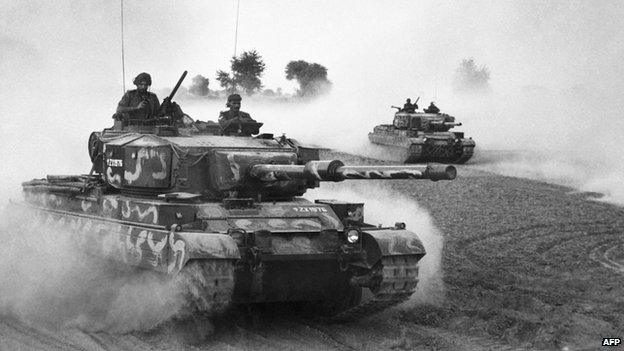
Lord Bilimoria's father helped Bangladesh secure its independence
By the time the late Lt Gen Bilimoria retired, he was commander-in-chief of the central Indian army, with 350,000 men under his command.
It was as a teenager that Lord Bilimoria decided to go into business instead of joining the army like his father.
"I decided that the army for me would have been too constraining. And if I had followed in my father's footsteps I was worried that I would always be compared to him, and be in his shadow," he says.
"Also I wanted more blue sky, and a career in business offered me a much broader opportunity."
After gaining a degree in commerce at the University of Hyderabad, Lord Bilimoria moved to London, where he qualified as a chartered accountant.
He then completed a law degree at Cambridge University in the late 1980s, which was when he came up with the idea for Cobra.
'Lager too fizzy, ale too bitter'
A lover of beer since his teenage years, Lord Bilimoria was unhappy with the quality of British lager, especially when drinking it with a curry.
He says: "The lager was too fizzy, too harsh and too bloating. It meant that I couldn't eat or drink as much as I would like.
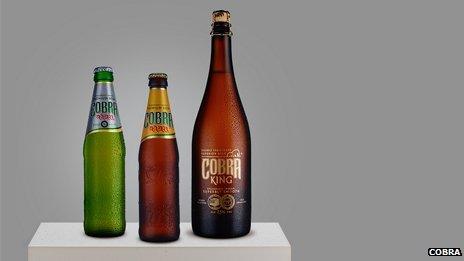
Cobra says its sales kept on growing throughout its financial woes
"At the same time, I found real ale to be great in a pub, but too bitter and heavy with food. So I came up with the idea of creating a beer with the refreshment of a lager, but with the smoothness of an ale.
"I wanted it to not just be drinkable in its own right, but a great accompaniment to all food, and particularly Indian cuisine."
Undeterred by having no experience of the beer industry, Lord Bilimoria went to the head brewer at what was then India's largest independent brewery, and together they developed the recipe for Cobra.
Larger bottles
And so Cobra Beer was born in 1989, with the first deliveries from India arriving by container ship into the UK in 1990.
Basing himself in an office in the Fulham area of south-west London, for the first year Lord Bilimoria delivered bottles of Cobra door-to-door in his Citroen 2CV, targeting Indian restaurants.
Initially Cobra was only available in big 660ml bottles, as such a large size is the most popular in India.
Lord Bilimoria says it gave the business an immediate advantage, as the bottles stood out in curry houses.
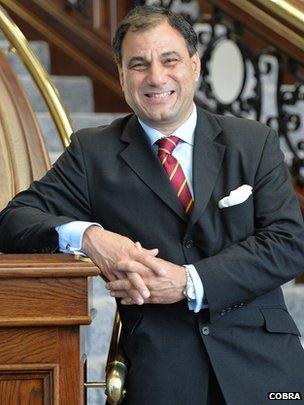
Lord Bilimoria joined the House of Lords in 2006
"People sitting at other tables would see the bottle and say, 'What is that?' The popularity spread like wildfire, people loved the taste, and we got 99% reorders."
With the business growing rapidly, in 1997 brewing was switched to the UK from India to help meet demand.
"We first checked with consumers, who said they didn't mind where we brewed. This is logical as the Indian food you eat here is not flown over from Delhi," says Lord Bilimoria.
Constant supply
Knighted in 2004 for his services to business and entrepreneurship, he was appointed to the House of Lords two years later.
Despite Cobra's financial problems in 2008, he is keen to stress that there was never any impact on production of the beer.
"Throughout the whole crisis the sales never dropped, and we maintained a seamless supply."
With Molson Coors owning a majority stake in the business since 2009, sales of Cobra have continued to grow strongly, albeit at an average of "either high single digit or 10%". And it is Molson's most profitable UK brand.
While Cobra continues to dominate the UK's Indian restaurant market, being sold at more than 98% of licensed curry houses, it is now also available at all the main supermarkets.
"I'm very proud of the beer," says Lord Bilimoria.
And with plans for a renewed push to get Cobra into more UK pubs and bars, he is confident the brand has a bright future.